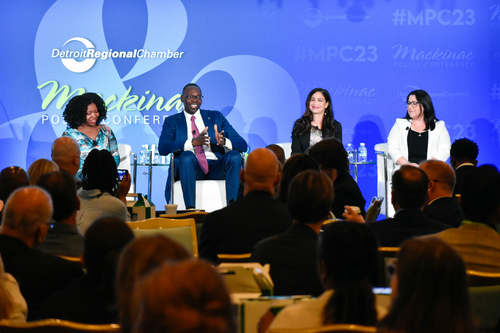Gilchrist stresses importance of inclusive policies, community-engaged policymaking strategies

Lt. Gov Garlin Gilchrist on Wednesday morning outlined the role communities play in creating inclusive policies and initiatives during a panel at the annual Mackinac Policy Conference.
Kat Stafford, a national investigative correspondent for The Associated Press who’s a Detroit native, moderated the event in which Gilchrist, alongside business and policy experts, shared perspectives on how to craft and implement inclusive policies for both governments and businesses.
“For children to thrive, they have to live in communities with equitable access to opportunities,” said Faye Alexander Nelson, Michigan director of the W.K. Kellogg Foundation, which hosted the panel.
“The policymaking process has an important impact on the lives of children, families and communities. There are many problems and challenges to address here and we know that we can’t solve all of them. But what we can do, what we can do is bring people into the process,” Nelson said.
Gilchrist shared the role inclusivity plays in driving Michigan’s policymaking, including efforts like education and business.

“Giving everyone equitable access to opportunity is our state will ultimately advance and move forward to its highest potential,” Gilchrist said.
“[Gov. Gretchen Whitmer and I] have been unapologetic about the fact that policies and programs and initiatives need to be more equitable. And by that we need to recognize different people, different communities have different needs, that we need to invest differently,” Gilchrist said.
From acknowledging that communities fighting poverty need deeper investment in education to recognizing that people of color have been barred from traditional finance and lending options for starting businesses, Gilchrist addressed specific steps the state has taken to enable these opportunities including the Michigan Economic Opportunity Fund that focuses on providing funding to disadvantaged communities.
“Our hope is the choices we make in the public sector can frankly be models for those private sector entities that have not yet caught up,” Gilchrist said.
Gilchrist, the state’s first African American lieutenant governor, also shared his experiences facing structural racism growing up in Detroit.
“I never met an entrepreneur as a child, I thought that businesses just happened,” Gilchrist said.
“What I saw were people who were working incredibly hard, who were dealing with unfair circumstances, who were overtly and covertly discriminated against,” he added.

When his grandmother bought him a computer, Gilchrist said he fell in love with technology. By pursuing technology as a profession, Gilchrist discussed his efforts to give back to the community, installing computers and teaching people to use them.
“So we think about being inclusive. It’s about not only bringing experiences to our communities, or exposure, exposure to technology, but it’s also about sitting with people and realizing what are the goals that they want to achieve?” Gilchrist said.
Gilchrist also addressed challenges to crafting inclusive policies.
“In the sort of second chapter of my career as a community organizer, what I learned is that, truth is, the people who experience the problem are the people who know the solution,” Gilchrist said.
“The other truth is people actually want to tell you what the solution is, but you can’t be scared to listen to it, scared to hear it and recognize that it might mean that you need to do something differently. And that’s okay,” Gilchrist said.
Other panelists echoed Gilchrist’s sentiments.
“You can learn a lot from the people around you … we call that a community-engaged approach,” said Celia Barrios-Millner, co-vice president of the Urban Institute’s Office of Race and Equity Research.
When crafting centered on inclusion, Gilchrist warned against overcomplicating the solution.
“It’s not complicated. If you want to understand how to deal with a challenge, you should talk to people who deal with a challenge and then create a space for them to be a part,” Gilchrist said.

There’s no magic formula to inclusion Gilchrist said, inclusion is being inclusive.
When asked about next steps for racial equity policy Gilchrist said he and Whitmer’s priorities at the conference are centered on growing the state so more people will come to, or choose to stay in Michigan to build their families and their future.
“I think critical to that equation is ensuring that every person again, no matter who you are, what walk of life you come from, what you look like, what you sound like, who you love, how you worship, or don’t worship, whatever, that you feel like you will be invested in respected protected under the law,” Gilchrist said.
Gilchrist cited policy examples like expanding the Elliot-Larsen Civil Rights Act to include LGBTQ+ people, getting rid of the so-called retirement tax, investing into individuals without access to financing through the Michigan Economic Opportunity Fund and efforts to expand Michigan’s technology industry.
“Everything that you’re going to hear from us is about what we can do to grow and how we can continue to invest in people,” Gilchrist said.








